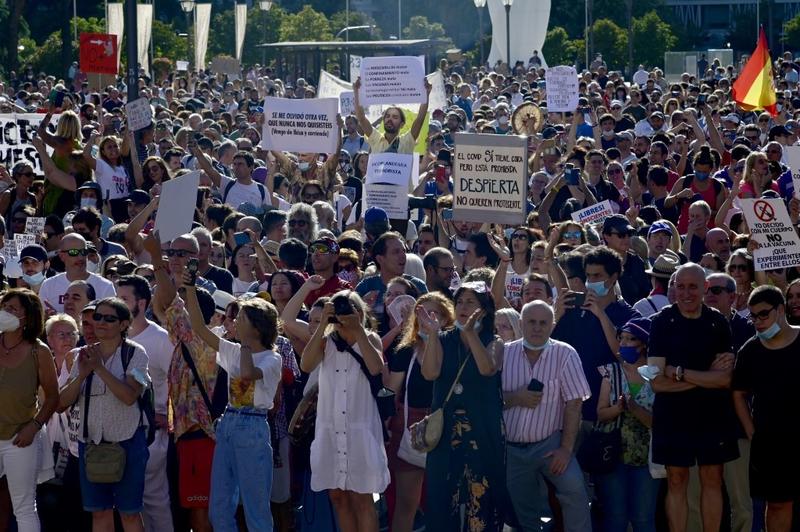 People gather holding signs and shouting slogans during a demonstration against the mandatory use of face masks as well as other measures adopted by the Spanish government to fight against coronavirus in Spain, on Aug 16, 2020, at the Colon square in Madrid (JAVIER SORIANO / AFP)
People gather holding signs and shouting slogans during a demonstration against the mandatory use of face masks as well as other measures adopted by the Spanish government to fight against coronavirus in Spain, on Aug 16, 2020, at the Colon square in Madrid (JAVIER SORIANO / AFP)
Spain and Italy ordered the shuttering of discos and Greece restricted hours for bars and restaurants amid concerns that Europe’s summer partying is reigniting the spread of the coronavirus.
In France, local authorities have sealed some public areas such as beaches to prevent wild parties with nightclubs closed since mid-March
As the holiday season gradually winds down, European officials are wary about returning vacationers spreading COVID-19 at workplaces and schools. Spain has again emerged as a hot spot, triggering new travel warnings in another blow to the country’s US$175 billion tourism industry.
In the past 14 days, Spain reported 116 new cases per 100,000 people, according to data from the European Centre for Disease Prevention and Control. That compares with 41 in France, 19 in the UK, 16 in Germany and 9.3 in Italy, the original epicenter of the outbreak on the continent.
ALSO READ: Europe's summer unravels with COVID spikes and travel chaos
Across the region, officials are caught between trying to foster an economic recovery after activity collapsed in the second quarter, and preventing a surge in infections that could stretch health systems and force even tighter restrictions.
“We cannot waste the sacrifices made in the past months,” Italian Health Minister Roberto Speranza wrote in a Facebook post late Sunday. Chancellor Angela Merkel told a meeting of her CDU party Monday in Berlin that rising infections in Germany are of concern, but still manageable. There is no scope currently for loosening restrictions, she said.
Irish emergency health authorities are meeting in Dublin on Monday to consider new measures to curb the pandemic after on Saturday reporting the most daily infections since May.
In addition to outbreaks at food-processing plants, concern is mounting around potential contagion in bars following a weekend video of a Dublin barman standing on a counter to pour shots into customers’ mouths. Ireland’s Chief Medical Officer Ronan Glynn described such scenes as “reckless.”
“The next three weeks are incredibly important,” Irish Health Minister Stephen Donnelly said on RTE radio interview.
From Ibiza to the crowded urban nightspots of Madrid, some 25,000 discos and clubs in Spain were struggling to emerge from one of Europe’s strictest lockdowns, which ended in June. Suspending operations again was part of a package of 11 measures the country’s regional governments agreed to take to curb the fastest virus growth rate among Europe’s major economies.
 Women dance on the sand at an outdoor restaurant of a beach in Fregene near Rome, Italy, on Aug 14, 2020. (TIZIANA FABI / AFP)
Women dance on the sand at an outdoor restaurant of a beach in Fregene near Rome, Italy, on Aug 14, 2020. (TIZIANA FABI / AFP)
The Health Ministry blamed nighttime socializing for fueling new outbreaks, casting a shadow over the government’s seven-week experiment to restore the country’s famed nightlife. Total cases surged by more than 27,000 last week.
“This will devastate us,” said Antonio Gomez of the SpainTOP travel agency in Madrid. “People don’t travel to Spain any more just for sun and beaches.”
Over the weekend, the Netherlands raised its travel advisory level to orange for three Spanish regions, including Madrid and the popular Balearic Islands. The advisory discourages nonessential travel and requires self quarantine upon return. The heightened alert comes after Prime Minister Mark Rutte’s government on Aug 6 tightened a range of measures domestically, including forcing cafes and restaurants to close.
TUI AG, the world’s biggest tourism operator, suspended trips to Spain from both the UK and Germany, after those countries issued similar warnings.
“It was totally incongruent to allow indoor clubs to reopen, and without insisting always on masks, yet put strict measures elsewhere,” said Pedro Macho, who took his family for the summer to the beach town of Chiclana in the south. “Here we are walking on the sand, and everyone is wearing masks, and kicking a ball is banned.”
After posting last week its highest daily increase since the start of the pandemic, Greece on Monday introduced new restrictions, requiring bars and restaurants to close between midnight and 7 am in the greater Athens region. The government also introduced an upper limit of 50 people at social events such as weddings in regions particularly affected by the virus.
In France, an increase of new cases over the past week -- near the alert level in areas such as Paris and Marseille -- has prompted a push for new measures. Local authorities have sealed some public areas such as beaches to prevent wild parties with nightclubs closed since mid-March. The ban on gatherings of more than 5,000 people has been extended until the end of October.
Austrians rushed back before a midnight deadline from Croatia, where as many as 40,000 spent their holidays. The country is a popular holiday destination as well as the home country of hundreds of thousands of people who came as “guest workers” in the 1970s or as war refugees in the 1990s and are now permanent residents or citizens of Austria.
A travel warning that kicked in Monday means returnees from Croatia now have to provide a negative coronavirus test at the border or go into a two-week quarantine. Foreign Minister Alexander Schallenberg warned that more travel warnings for other European regions could come at short notice.
More than 2,000 Austrians have the virus, a level last seen in April, and about 20 percent of the new cases in recent weeks have their origin abroad, according to health agency Ages.
The trends aren’t getting worse everywhere. Belgium is seeing a decline in the daily number of infections for the first time since the epidemic started regaining strength in mid-July, and the UK continues to open up an economy that’s been hit more than any major European nation during the lockdowns, easing restrictions over the weekend on indoor performances, weddings and barbers.
READ MORE: Masks and bleach: Europe gears up for post-lockdown tourism
In the Nordic region, governments are dealing with a sudden rise in new cases by telling citizens to use face masks for the first time. The only exception is Sweden, which has avoided a full lockdown throughout the pandemic.
Swedes continue to abide by the same guidelines of voluntary distancing that were first encouraged in March. And while infection rates have been ticking up in Denmark, Norway and Finland, they’ve started to slow in Sweden, albeit from much higher levels.



